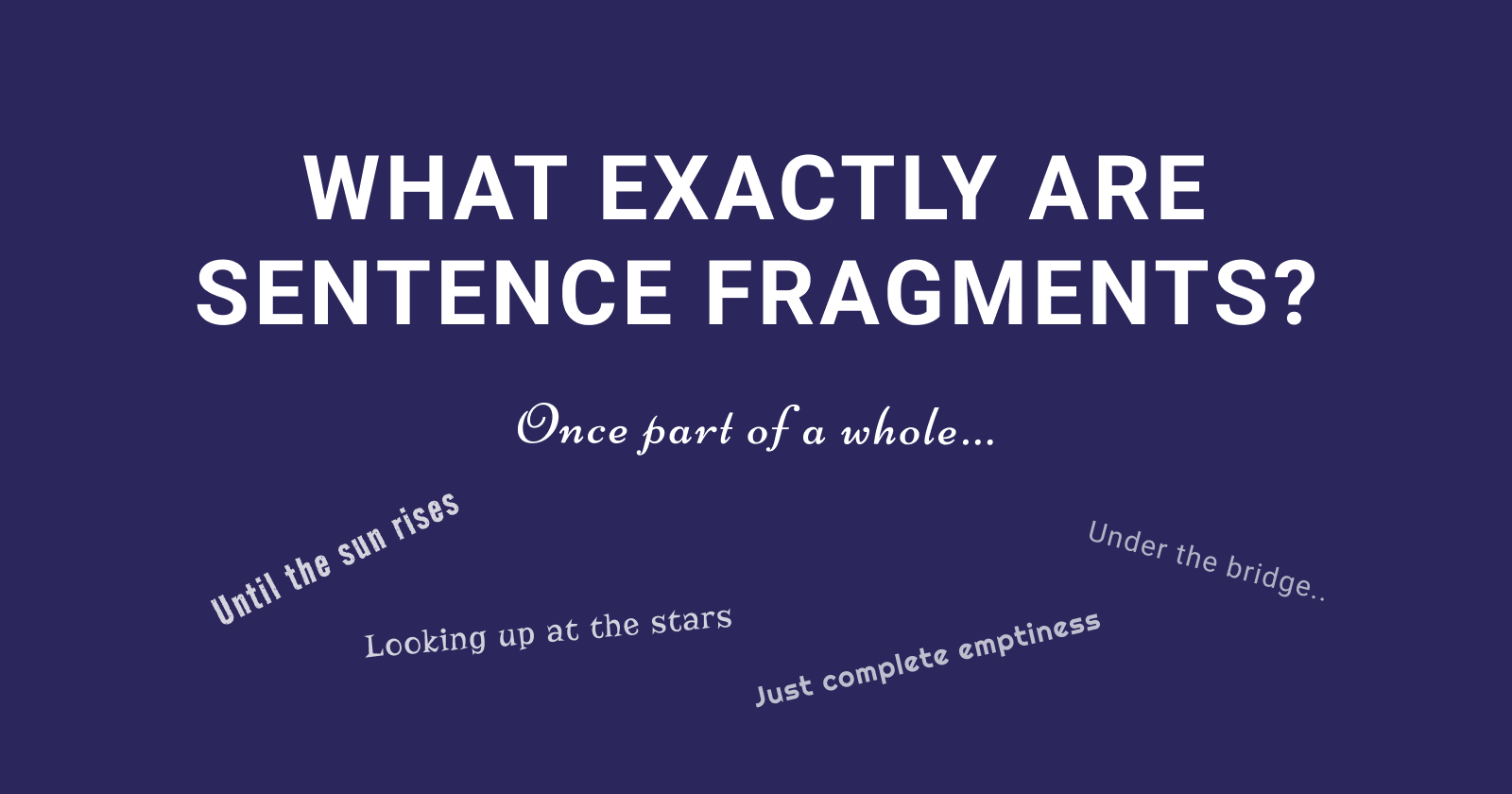Technical Writing Bits: What Exactly Are Sentence Fragments?
 Mbaziira Ronald
Mbaziira Ronald
Have you ever heard of sentence fragments? Do you know what they are? Where and how to use them?
No?
Alright, sit back and relax. Let me take you for a ride.
In all forms of writing, including technical writing, and fiction writing, letters make up words, and words make up sentences. These sentences act as the building blocks that form paragraphs that bring out a well-connected, thoughtful, and easy-to-understand technical piece aimed to solve a particular problem, convey awareness or introduce an idea to the reader.
However, due to typographical and grammatical errors or just the mere will of the writer, sentences can be disjointed and lacking. And when this happens, words fail to form sentences and become sentence fragments.
In this article, you will learn what sentence fragments are and where to use them.
Let's get started!
Pre-requisites
To follow along well with the article, let me refresh your knowledge of these terms.
Verb: Is an action word or phrase.
Noun: Is a person, place, concept, or thing.
Pronoun: a noun that replaces another noun
Conjunction: Is a word that connects two nouns or phrases
Adjective: Is a word or phrase that modifies or describes a noun.
Clause: Is a group of words that contains a subject and a verb that have a relationship.
Subject: Is the person, place, or thing that is performing the action of the sentence.
What is a Sentence?
A sentence is a grammatical unit of one or more words that expresses a complete thought.
A subject and a predicate make up a sentence. The predicate describes the subject.
Examples of sentences:
HMTL has both closing and self-closing tags.
CSS Flexbox and Grid concepts are a must for good responsive web design.
Full-stack developers know both front-end and back-end technologies.
Its use in many areas of programming makes JavaScript a powerful language.
What are Sentence Fragments?
A sentence fragment is a group of words that resembles a sentence but cannot stand alone as a complete sentence. Sentence fragments usually lack a subject, a verb, or both.
Here are some examples:
Cloud computing services, AWS, Azure.
Branding and visual identity, creating consistent brand experiences.
Go code now.
Yeah, quite awesome work.
Mobile app development, hybrid vs native.
Frontend, Backend, all JavaScript.
After coding, exams.
Really love UI and UX.
Agile software development methodology, Scrum, and Kanban.
Types of Sentence Fragments
There are several types of sentence fragments depending on the cause. We are going to use, the three types below as examples:
Depending on what has caused a would-be sentence to be a sentence fragment, sentence fragments can be of many types. Let's take a look at these three types below.
Dependent clauses fragments
These are clauses missing an independent clause.
Examples:
Because plagiarism is not good, a penalty is given.
While learning technologies, doing projects is good.
Whereas hacking is awesome, misuse is discouraged.
Phrase fragments
A phrase fragment is a group of words that lack either a subject or a verb and cannot stand alone as a sentence.
Phrase fragments have multiple types, which we shall not be covered in this article since we are looking at phrase fragments in general. Below are some categories of phrase fragments.
Prepositional phrase fragments
Infinitive phrase fragments
Adjective phrase fragments
Noun phrase fragments
Verb phrase fragments
Absolute phrase fragments
Examples of phrase fragments:
Before the party
In the night
During the day
Lost in the war
Imperative verb fragments
These are sentences that contain only an imperative verb and lack a subject. Imperative verbs are commands such as Go code now.
You should note, however, that not all imperative verbs are sentence fragments.
Examples
Clean the room
Buy it
Record now
Publish it
How to Identify Sentence Fragments By Type
Let's look at some common examples in each type specified above and the possible ways of how each would look when it's a stand-alone sentence.
Dependent clauses fragments
Dependent clause fragments can be identified by their subordinating conjunctions such as because, while, before, after, and since.
While i was compiling it.
Although the load time is good
Whenever executing it takes place
Phrase fragments
You identify phrase fragments by their lack of verbs or subjects. And in this case, the subject is either a noun or a pronoun.
In the documentation, providing clear instructions.
Using active voice, improving readability.
Being concise, avoiding redundancy.
During the editing process, check for errors.
In technical reports, use proper formatting.
Imperative Verb fragments
Imperative verbs are commands. So to identify them, look for sentences that are direct commands.
Launch the editor
Create the file
Copy the code
Paste the code
Run the code
How to Fix Sentence Fragments
You can fix sentence fragments by introducing what is lacking, usually a subject or verb, or turning it into an independent clause.
Let's use the above-listed sentence fragments, each in its type, and see how we can fix them.
Dependant clause fragments
Fragment: - Because plagiarism is not good, a penalty is given.
Sentence: - A penalty is given because plagiarism is not good.
Phrase fragments
Fragment: - Lost in the war
Sentence: - The watch was lost in the war
Use Cases of Sentence Fragments
These are some of the areas of writing in which to find the use of sentence fragments, be it to a small or large extent.
Informal writing especially in conversations
In poetry
Journalism
Fiction writing
In academic writing
Why Sentence Fragments are Not Commonly Used in Technical Writing
The use of sentence fragments in technical writing is rare due to the nature of both sentence fragments and technical articles.
Sentence fragments can add a sense of incompleteness and misinterpretation to technical articles specially aim to provide a solution to a particular problem or convey an idea to the reader.
Conclusion
To wrap up, you should avoid using sentence fragments in your articles.
This is the first article in my Technical Writing Bits series. I am sharing bits of technical writing that I find interesting and think writers rarely explore but love to know.
I encourage you to explore more amazing bits of technical writing on your own as there is more cool stuff to learn.
I hope to see you here soon. Thanks for the read 🙌
Subscribe to my newsletter
Read articles from Mbaziira Ronald directly inside your inbox. Subscribe to the newsletter, and don't miss out.
Written by

Mbaziira Ronald
Mbaziira Ronald
I am a Software Developer. I love and write about Web Development, HTML/CSS, JavaScript, WordPress & Technical writing.